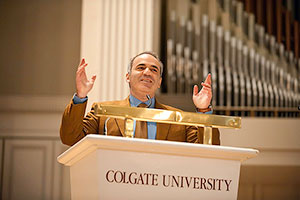![]() Former world chess champion Garry Kasparov, in what he said was his first speech at an American university, lambasted Russian Prime Minister Vladimir Putin and spelled out his opposition coalition’s efforts to create a “true democracy” in Russia.
Former world chess champion Garry Kasparov, in what he said was his first speech at an American university, lambasted Russian Prime Minister Vladimir Putin and spelled out his opposition coalition’s efforts to create a “true democracy” in Russia.
Kasparov spoke Friday in Memorial Chapel and took part in a panel discussion the next day called Chess Champion of the World vs. the Machine: The Inside Story.
The visit by Kasparov, who turned to politics after retiring in 2005 as the No. 1 chess player in the world, was supported by the The Kerschner Family Series Global Leaders at Colgate program and the Institute for Philosophy, Politics, and Economics (PPE).
Kasparov was unrelenting in his free public lecture about what he called the pervasive corruption in Putin’s government and how the prime minister uses the word democracy as a propaganda tool to cover up his repressive tactics.
“The number one export of Russia is corruption,” said Kasparov. He added that a nation such as Russia can call itself a democracy but turn that into a misleading and empty label if the government doesn’t adhere to the rule of law, protect individual liberties, and provide accountability.
Now the chairman of the United Civil Front and political leader of The Other Russia, a coalition of opposition parties, Kasparov likened Putin to Lord Voldemort, the villain in the Harry Potter books.

Former world chess champion Garry Kasparov speaks in Memorial Chapel on Friday. (Photo by Andy Daddio)
Russian President Dmitry Medvedev can fire Putin under the country’s constitution, said Kasparov, but the president doesn’t have the physical constitution to do it.
Kasparov noted that his coalition pursues nonviolent forms of opposition, and that by employing “tactics of survival” and utilizing the Internet to help spread the message, it has made some progress.
He argued that Putin’s high approval numbers in polls were misleading because many citizens are still too afraid to voice disapproval, fearing government reprisals.
Jason Finder ’12 was among those who continued the discussion about the Russian government and the merits of what Kasparov said at a dinner with the guest of honor in the Hall of Presidents.
“I think in some ways we need to take what we hear from a government with a grain of salt,” he said. “We need to consider everything we can learn and evaluate it as a whole.”
Finder had taken the Liberal Democracy and its Limits course with political science professor and PPE director Stanley Brubaker.
Kasparov noted in his talk that he had asked Brubaker for the course syllabus in advance of his speech, titled “Does Liberal Democracy Have a Future in Russia?”
Brian Thurman, whose daughter Elaine is a first-year student, said he thought it took a lot of guts for Kasparov to talk so openly about his coalition’s opposition efforts.
“It is good for us to hear these kinds of questions and concerns,” he said. “To me, it shows that there is hope for change.”





















